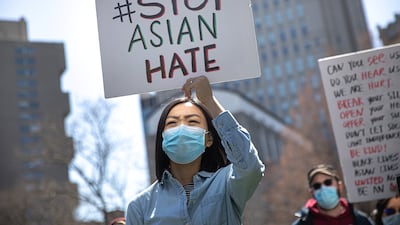Hate crimes in the US surged 11.6 per cent in 2021, with the largest number motivated by bias against black people, followed by crimes committed due to a victims' ethnicity, sexuality or religion, the FBI has said in a new report.
The report, released on Monday, said that hate crime incidents rose to 9,065 in 2021 from 8,120 in 2020.
The FBI defines a hate crime as a criminal offence motivated “by the offender's bias(es) against a race, religion, disability, sexual orientation, ethnicity, gender or gender identity”.
The bureau said 64.5 per cent of hate crime victims in 2021 were attacked because of their race, ethnicity or ancestry, while 15.9 per cent were targets because of their sexual orientation and 14.1 per cent due to their religion.
The largest number of reported incidents, about 2,233, were driven by anti-African-American bias.
Of the religion-based hate crimes, a little more than half were committed against Jewish people.
About 948 of the reported crimes were motivated by anti-white bias, while there were 543 incidents against gay men and 415 involving members of the broader LGBTQ community.
Bias against Hispanics led to 433 incidents, while the FBI reported 305 such incidents against Asians.
US Attorney General Merrick Garland has made tackling hate crimes a top priority for the Justice Department.
In 2021, he expanded funding and other resources to help track and investigate hate crimes, and ordered prosecutors to step up both criminal and civil investigations into such incidents.
“We are continuing to work with state and local law enforcement agencies across the country to increase the reporting of hate crime statistics to the FBI,” said Associate Attorney General Vanita Gupta.
“Hate crimes and the devastation they cause communities have no place in this country. The Justice Department is committed to every tool and resource at our disposal to combat bias-motivated violence in all its forms.”
The rise in hate crimes in 2021 was the largest in more than three decades, Brian Levin, director of the Centre for the Study of Hate and Extremism at California State University, San Bernardino, said in an interview.
“This represents a horrifying new era that we're in with elevated historic levels across many years and a broken record in 2021.”
The FBI's new analysis marks the first time the bureau has been able to confidently report national hate crimes trends since it transitioned to a new data collection system.
Uniform crime data released by the FBI in October 2022 contained gaps, with only 52 per cent of law enforcement agencies reporting a full 12 months of 2021 information.
For its supplemental report, FBI officials said they were able to retroactively include crime data from some of the country's largest cities that had not yet made the switch to the new reporting format.
The Anti-Defamation League, which collects its own criminal and non-criminal data on acts of hate against Jewish people, counted a total of 2,717 anti-Semitic incidents in 2021 — the highest figure since the organisation began tracking such data in 1979.
“With anti-Semitic incidents up across the board in nearly every category we track,” said Jonathan Greenblatt, chief executive of the ADL, “a whole-of-government, whole-of-society approach will be needed to address these extremely disturbing trends.”
Agencies contributed to this report































